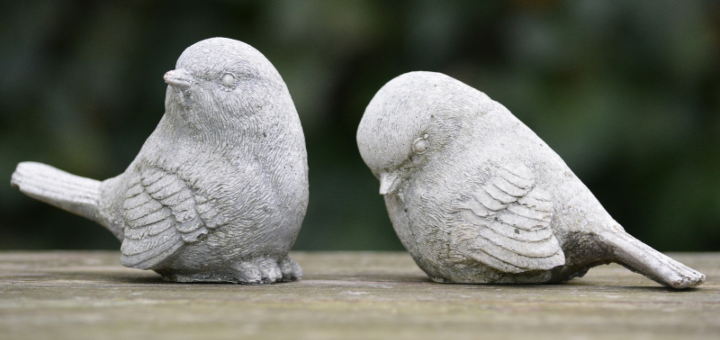
 Image credit: Pixabay.com (2014), CC0/PD[/caption]
God, in His Wisdom, has granted me many opportunities to grow over the years. While I didn’t always see it this way, growing up with a mentally ill mother and unwittingly marrying an alcoholic husband gave my soul fertile ground in which to blossom. Now I can see their selfish, and at times hurtful, behaviors for what they are: symptoms of their unfortunate conditions.
Most days, their actions do not disturb my peace of mind or bring me to tears. They simply give me food for thought about my own responses and behavior.
Recently, though, my husband said something to me that really shook me to my core. We were watching television together after my son was asleep, and one of the characters on the show said something about the power of love. My husband turned to me and said, “Well, you know what having love like that is like, but I don’t.” His tone made it clear. He was saying, “I love you, but you don’t love me.”
My husband says provocative things like this to me fairly often. I’ve heard from other people who love untreated alcoholics that this is common. They either want an external reason for why they feel so terrible inside, or they are, perhaps unconsciously, picking a fight to have an excuse to drink.
I have learned to not take the bait; I say something non-committal, like a neutral-toned “oh” or “hmm.” Sometimes, as I did in this particular instance, I say nothing. But unlike the other times where I just didn’t respond to the provocation, I started crying quietly to myself.
I started crying because this was not the first time someone I love deeply and make daily sacrifices for accused me of not loving them.
Love Unnoticed
I flashed back to a time in my early teen years. I was sitting at the kitchen table with my mother, who had her head in her hands and was on the verge of tears. She told me she felt like no one loved her. I told her I loved her, and she replied that it didn’t feel like I loved her. I asked her how I could show her that I loved her, and she said, “I don’t know.” I felt so defeated and rejected. I tried so hard to help my mother by being a self-sufficient daughter and taking care of my siblings. She didn’t seem to notice my acts of love. I’m pretty sure I cried alone that day, too ... until it was time to help my younger sister with her homework, before I did my own.
Miracles are not enough for us
The day after my husband basically said I didn’t love him, he repeated the sentiment on the way to Mass. He told our son, “I care about how Mommy feels, but she doesn’t care about how I feel.” This time I didn’t cry, but I thought about how utterly backwards his perception was.
I was still thinking about this when we heard the first reading at Mass from Exodus, where the Israelites grumble about being thirsty. They seem to think the God who performed mind-blowing miracles to get them out of slavery, and sent manna and quail from out of the clear blue sky to feed them, hated them, and they were better off as slaves.
Usually when I hear passages like this, I think of times I have acted like the ancient Israelites. The times I praised God for His goodness, but soon after lamented with the equivalent of “Yeah, but what have you done for me lately, God?!”
This time, though, I thought of how my situation was a little, tiny bit like what God experiences with us weak humans. He gives us so many good things, sacrifices to the point of death for us. Still He is met with disbelief in His Love and denial of His very existence.
A type of emotional stigmata?
There was a time in my life that I wanted to share in Christ’s pain on the cross, to be more closely united with Him. I admired those saints who were blessed with stigmata, and wondered if Christ would find me worthy of such a gift.
I know now I am not strong or holy enough for the gift of stigmata. Perhaps, though, through the mother and husband He gave me, God allowed me to receive a very small share in His heartache. It still hurts when ones I love dearly cannot see my love because of their conditions. But if it increases my union with God, I know that, by God’s grace, I can continue to love — even if the ones I love don’t notice.
Image credit: Pixabay.com (2014), CC0/PD[/caption]
God, in His Wisdom, has granted me many opportunities to grow over the years. While I didn’t always see it this way, growing up with a mentally ill mother and unwittingly marrying an alcoholic husband gave my soul fertile ground in which to blossom. Now I can see their selfish, and at times hurtful, behaviors for what they are: symptoms of their unfortunate conditions.
Most days, their actions do not disturb my peace of mind or bring me to tears. They simply give me food for thought about my own responses and behavior.
Recently, though, my husband said something to me that really shook me to my core. We were watching television together after my son was asleep, and one of the characters on the show said something about the power of love. My husband turned to me and said, “Well, you know what having love like that is like, but I don’t.” His tone made it clear. He was saying, “I love you, but you don’t love me.”
My husband says provocative things like this to me fairly often. I’ve heard from other people who love untreated alcoholics that this is common. They either want an external reason for why they feel so terrible inside, or they are, perhaps unconsciously, picking a fight to have an excuse to drink.
I have learned to not take the bait; I say something non-committal, like a neutral-toned “oh” or “hmm.” Sometimes, as I did in this particular instance, I say nothing. But unlike the other times where I just didn’t respond to the provocation, I started crying quietly to myself.
I started crying because this was not the first time someone I love deeply and make daily sacrifices for accused me of not loving them.
Love Unnoticed
I flashed back to a time in my early teen years. I was sitting at the kitchen table with my mother, who had her head in her hands and was on the verge of tears. She told me she felt like no one loved her. I told her I loved her, and she replied that it didn’t feel like I loved her. I asked her how I could show her that I loved her, and she said, “I don’t know.” I felt so defeated and rejected. I tried so hard to help my mother by being a self-sufficient daughter and taking care of my siblings. She didn’t seem to notice my acts of love. I’m pretty sure I cried alone that day, too ... until it was time to help my younger sister with her homework, before I did my own.
Miracles are not enough for us
The day after my husband basically said I didn’t love him, he repeated the sentiment on the way to Mass. He told our son, “I care about how Mommy feels, but she doesn’t care about how I feel.” This time I didn’t cry, but I thought about how utterly backwards his perception was.
I was still thinking about this when we heard the first reading at Mass from Exodus, where the Israelites grumble about being thirsty. They seem to think the God who performed mind-blowing miracles to get them out of slavery, and sent manna and quail from out of the clear blue sky to feed them, hated them, and they were better off as slaves.
Usually when I hear passages like this, I think of times I have acted like the ancient Israelites. The times I praised God for His goodness, but soon after lamented with the equivalent of “Yeah, but what have you done for me lately, God?!”
This time, though, I thought of how my situation was a little, tiny bit like what God experiences with us weak humans. He gives us so many good things, sacrifices to the point of death for us. Still He is met with disbelief in His Love and denial of His very existence.
A type of emotional stigmata?
There was a time in my life that I wanted to share in Christ’s pain on the cross, to be more closely united with Him. I admired those saints who were blessed with stigmata, and wondered if Christ would find me worthy of such a gift.
I know now I am not strong or holy enough for the gift of stigmata. Perhaps, though, through the mother and husband He gave me, God allowed me to receive a very small share in His heartache. It still hurts when ones I love dearly cannot see my love because of their conditions. But if it increases my union with God, I know that, by God’s grace, I can continue to love — even if the ones I love don’t notice.
Copyright 2019 Monica Portogallo
About the Author

Monica Portogallo
Monica Portogallo is a mother and registered dietitian nutritionist who does her best not to miss the lessons God sends to her through the joys and struggles of daily life. She lives in California.


.png?width=1806&height=731&name=CatholicMom_hcfm_logo1_pos_871c_2728c%20(002).png)
Comments